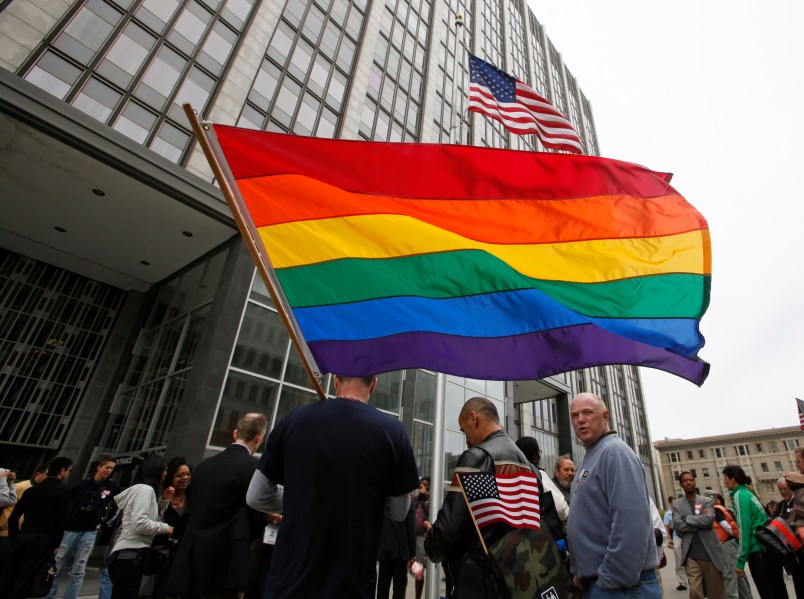A federal judge struck down Indiana’s ban on same-sex marriage Wednesday in a ruling that immediately allowed gay couples to wed.
The court clerk in Marion County, home to Indianapolis, began issuing marriage licenses to same-sex couple about an hour after U.S. District Judge Richard Young ruled that the state law violates the U.S. Constitution’s equal-protection clause.
“Same-sex couples, who would otherwise qualify to marry in Indiana, have the right to marry in Indiana,” he wrote. “These couples, when gender and sexual orientation are taken away, are in all respects like the family down the street. The Constitution demands that we treat them as such.”
The Indiana attorney general’s office said it would appeal the ruling but declined further comment.
The ruling involves lawsuits filed by several gay couples, who along with the state had asked for a summary judgment in the case. Young’s ruling was mixed but generally sided with the couples and prevents the state from enforcing the ban.
“Indiana now joins the momentum for nationwide marriage equality and Hoosiers can now proclaim they are on the right side of history,” Lambda Legal, the national gay rights group that represented five of the couples, said in a statement.
The decision came the same day the 10th U.S. Circuit Court of Appeals upheld a lower court ruling overturning Utah’s gay marriage ban, marking the first time a federal appeals court has ruled that states must allow gay marriage. That ruling puts the issue a step closer to the U.S. Supreme Court.
A movement to ban gay marriage in the Indiana Constitution faltered during this legislative session when lawmakers removed language about civil unions from the proposed amendment. That means the soonest the issue could appear on a ballot would be 2016.







When the first 3 or 4 states allowed marriage equality, I popped open a bottle of champers each time. If I opened a bottle each time now, I would be snockered 98% of the time. I’ll just put a bottle in to chill for when the 50th state is accomplished.
Gays are celebrating like it’s a state by state pub crawl.
And we owe it all to Antonin Scalia. Ironic, ain’t it.
The statement in this article, “Young’s ruling was mixed but generally sided with the couples . . .” is horribly misleading, if not flat-out wrong. The court found that marriage equality is a fundamental right under the Constitution and permanently banned the enforcement of any Indiana state law that would prohibit, penalize or fail to acknowledge same-sex marriage. That’s a 100% victory, not just “generally sided with the couples.”
The only “mixed” part of the ruling was that the Court ruled that Indiana’s governor was dismissed as a defendant, but he was dismissed specifically because he had no role or authority to enforce or prohibit any laws or actions involving marriage. (The court also dismissed all the claims involving temporary injunctions because they are moot, in light of the court’s imposition of permanent injunctions.)
Although I support the emotion of your sentiment, I have to point out, to those who might actually “give a damn” or not understand the nuances:
There really is nothing ironic about this and Scalia. Scalia went on a hate-filled tirade in the Lawrence case, and tried to bully the other Justices with the threat that prohibiting legislation based on subjective morality (the belief that homosexuality is immoral) would make it legally impossible to prohibit same sex marriages. While I deplore his motivation to issue that threat, everyone that matters in this debate agrees with his logic. Most importantly, the Justices in the majority on that case, and the Windsor case, where he repeated his arguments, clearly saw that the only harm being done was the unconstitutional discrimination of homosexuals. Scalia didn’t say anything the rest didn’t already know, and didn’t implicitly support.
If there is any ironic humor in this, it is on Gingrich. Congress rushed through DOMA, which was not only facially unconstitutional, but utterly stupid and beyond the scope of federal authority. But because it was purely theoretical at the time it passed, and could not affect anyone for another 7 years, after the first same sex marriage was allowed, it could not be tested in the courts. In the meantime the majority of states passed their own laws modeling DOMA, creating the house of cards that are tumbling down as we rejoice. But for DOMA, marriage equality would have had a much slower, more convoluted path to legitimacy.